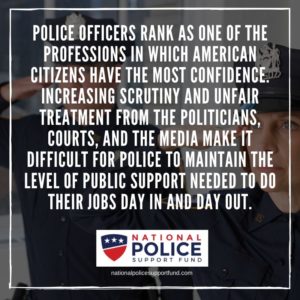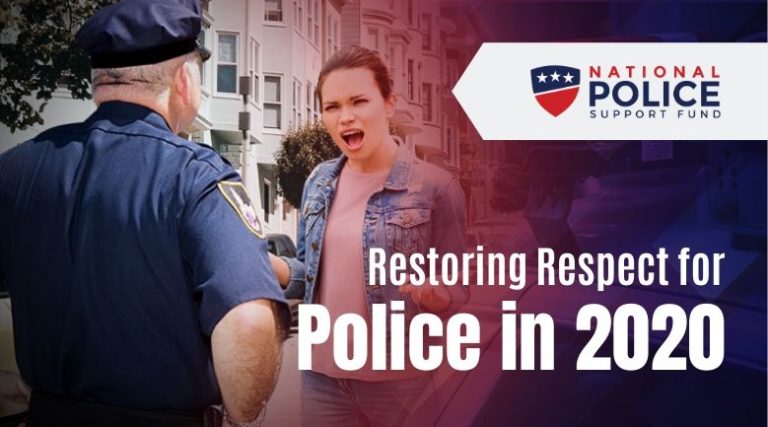Law enforcement is one of the few professions where employees regularly put their lives on the line in the service of helping the public and creating safer communities for people from all walks of life.
Increasing scrutiny and unfair treatment from the politicians, courts, and the media make it difficult for police to maintain the level of public support needed to do their jobs day in and day out.
Last year we created a petition in efforts to stop violence against police officers and restore the respect they deserve, and wrote a series of articles highlighting the disrespect and different cases of violence and disregard for law enforcement officers. As we prepare for a new year, let’s take a closer look at the issue of respect for police and why it matters now more than ever.
By the Numbers
Police officers rank as one of the professions in which American citizens have the most confidence. This means that police officers are generally trusted to perform their duties correctly and professionally. However, according to the most recent Gallup polling numbers, officers still rate at only a 53% confidence rate as an institution. . According to the most recent findings from Gallup, only 53% of Americans said they have confidence in the police as an institution.
The lack of confidence has ebbed and flowed over the years as negative coverage of police filled the airwaves. If you look at the Gallup data over time, it’s easy to see a downward trend whenever there’s a major police incident in the news.
Confidence in law enforcement fell to a low of 52% in 2015 in the midst of incidents related to the Black Lives Matter movement. The highest levels of support for police came between 2001 and 2007, when Americans saw the power law enforcement can have on and after September 11.
The problem is even worse in the places that appear to need police protection most. In Chicago, which has one of the highest homicide rates of any city in the country, only one-third of residents in homicide-impacted areas say they have “a lot” of respect for law enforcement, according to Gallup.
Something is clearly wrong here. At a time when Chicago’s residents need greater police protection, those same residents have less respect for police than ever. These things go hand-in-hand. As you know, police can’t do their jobs well without support from those they serve.
Why Respect Matters
Attorney General William Barr recently called attention to the lack of respect shown for police when he said communities “have to start showing the respect and support that law enforcement deserves.”

Law enforcement officers need to make countless life-or-death decisions every day, and public support for that work is critical. People need to feel confident that police officers have their best interests in mind as they work tirelessly to protect and serve their communities.
A decline in trust and respect makes it much more difficult for officers to do their jobs. One minute of resistance from a community member during an incident could literally be a matter of life or death.
Public hostility toward law enforcement also provides more fodder for media who are chasing their next headline and politicians who are looking for someone to blame in their case to win the next election.
A lack of respect for police also impacts the ability for individual police forces to recruit and retain officers. We’ve previously written about the shortage of police officers in cities and towns across the country.
The recruiting problems police departments face only become worse when unemployment in the U.S. remains at record lows. When workers have more options, they’re likely to choose a job that will not result in putting their lives in danger only to be caught up in a scandal over their actions.
How We Can Speak Up
Moving into a new year, it’s unlikely that anything about the media or other parts of government is going to improve public perception of police. We need to take matters into our own hands and demonstrate to our communities the value we provide and how essential it is to making everyone’s quality of life better.
One place to start restoring that respect is within our own police organizations. If officers do not have respect for the profession and for one another, how can we expect the public to feel any differently?
Kevin Dowling, a police trainer in Maryland, sums it up well:
“We can live our faith in any profession and at any level of leadership,” Dowling told Loyola University, his alma mater. “We can be effective without compromising our beliefs. We can tackle hard issues, be they human rights violations or taking someone into custody for a serious crime like homicide, while still treating everyone with dignity.”
Another path forward is to work with elected officials to pass laws that put respect for police front and center. Canada took steps in this direction earlier this year with the Comprehensive Ontario Police Services Act, which explicitly aims to restore respect for police officers across the province.
Legislative actions like this require cooperation between police and politicians, but that collaboration and solidarity can go a long way toward changing public opinion for the better.
“Every day our police do incredible work to keep our families safe,” said Sylvia Jones, Minister of Community Safety and Correctional Services, said in a news release. “Often this work is silent, preventative and unseen. Sometimes it requires police to put themselves in harm’s way. And occasionally it requires police to make difficult life or death decisions in the blink of an eye. But, no matter what, our police can be counted on to protect us. They always have our back. It’s about time their government had theirs.”
These words offer a hopeful model for 2020. Every police officer and police department has the power to change public perception and restore the respect and trust that this profession deserves.








